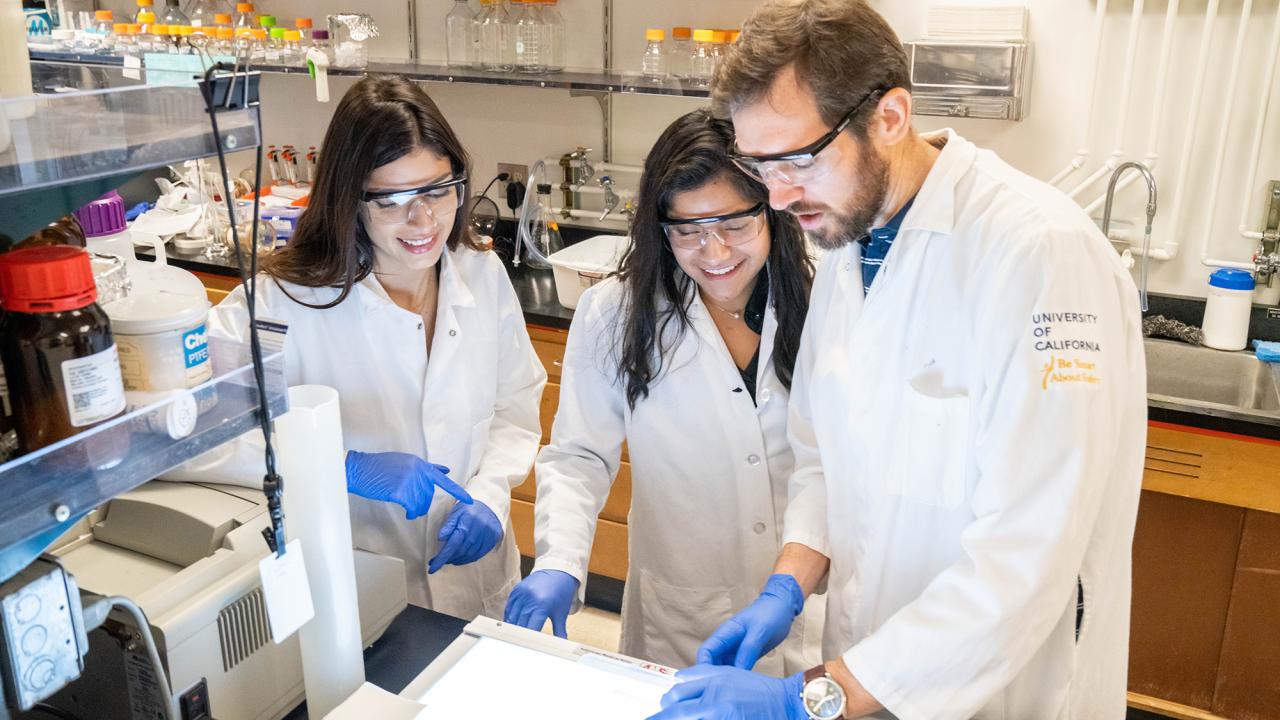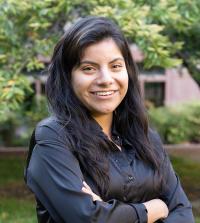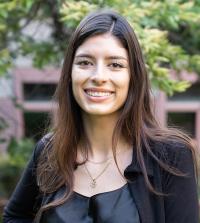
CBS DACA Students Awarded American Heart Association Fellowship
Maria Ayala and Eimy Castellanos recognized for work with protein complex essential for the normal function of cells
Two Ph.D. students in the College of Biological Sciences have been awarded prestigious fellowships from the American Heart Association (AHA) to support their research on Respiratory Complex I, a protein complex that generates energy inside human cells.
Maria Ayala and Eimy Castellanos, both third-year doctoral students in the laboratory of James Letts, an assistant professor of molecular and cellular biology, will receive $65,000 in funding over two years. The American Heart Association (AHA) Predoctoral Fellowships were announced in December of 2022. Ayala also received a Gilliam Fellowship from the Howard Hughes Medical Institute, in July 2023. This fellowship, designed to promote diversity and inclusion in science, will provide $53,000 per year in funding, for up to three years.

Respiratory Complex I, which Ayala and Castellanos study, is biology’s version of the internal combustion engine. Scientists aren’t certain how most of the structure’s 45 interlocking proteins function, but know that the complex plays a major role in the creation of energy from the controlled oxidation of carbon compounds.
High Stakes
Fellowships like this one are crucial for students who want to continue in academic research, and set them up for future funding opportunities. But for Ayala and Castellanos, the stakes were even higher.
Unlike the majority of their peers, both have Deferred Action for Childhood Arrivals (DACA) immigration status. They were born outside the United States, and were brought into the country as undocumented children by their parents.
Federal programs run by the National Institutes of Health and the National Science Foundation provide fellowship funding to Ph.D. students across the country, but are unavailable to DACA recipients. The AHA fellowship is one of the few for whom DACA recipients are eligible.
“To have the same opportunities that are afforded to other scientists, they had to get one of these fellowships,” says Letts. “They’re very competitive. It’s remarkable that they both got it.”
Receiving the fellowship represents the latest step in what has been a long and complicated climb for Ayala and Castellanos.
Farm to Laboratory
Maria Ayala was born in the Mexican state of Michoacán, to parents who didn’t complete high school. Her father farmed cows, providing milk and meat for the family. Her interest in learning began early. She recalls long afternoons at her grandmother’s house, reading books and Archie comics, while lying in a hammock strung across a room that was originally built to be used as a pig sty (though at the time it was used for storage).

She was brought to the United States as a 7-year-old, and began learning English while attending third grade. “It was definitely alienating,” she says, “just jumping into something where I had no idea what was going on.” But she persevered, and is grateful for the many opportunities that followed.
During college at UC Santa Cruz, she worked with a faculty member who studied circadian rhythms. There, she became interested in structural biology — the inquiry of how a protein’s 3D structure contributes to its precise function.
This led her to join Letts’s lab for her Ph.D. research at UC Davis. Here, she is using cryogenic electron microscopy (cryoEM) to map the detailed structure of Complex I. Mutations to one of its constituent proteins, called NDUFS4, result in Leigh syndrome, a fatal genetic disease that causes breathing problems, heart dysfunction, and degeneration of the nervous system. Many other diseases stem from mutations to other components of Complex I.
Ayala hopes to learn how NDUFS4 contributes to the overall structure and function of Complex I, and how NDUFS4 influences the way that Complex I binds to two other large respiratory complexes, called Complex III and Complex IV. She hopes to eventually work in the pharmaceutical industry, developing drugs to treat Leigh syndrome and other diseases.
Discovering an Origin Story
Eimy Castellanos arrived in the US from Mexico at the age of 4. But not until eighth grade did she discover that she was undocumented. While listening to her talk about getting a driver’s license, her father informed her that this simple goal would be difficult without a social security number. “That forced me to reassess my identity.” she says. “It motivated me to think about life in a broader context, and how all of us are connected regardless of legal status.”

Castellanos became interested in studying the origin of life. When she arrived at UC Davis, Letts invited her to pursue her Ph.D. in his lab, pointing out that one cannot understand the origin of life without understanding its energy source.
While her lab mate, Ayala, studies Complex I from mice, Castellanos studies a simpler version, found in a soil bacterium called Paracoccus denitrificans. With only 17 constituent proteins, it is thought to resemble the evolutionary ancestor of the more complicated versions of Complex I that exist in plants, fungi, and animals – including humans. She will use cryoEM to map the structure that it forms when it binds to the bacterial versions of Complex III and Complex IV.
Most research on Complex I is currently done in mammals; so Castellanos believes that her studies in bacteria will provide an informative complement. “It’s important to study different organisms to understand unifying themes of biology,” she says. That broader understanding could eventually lead to treatments for genetic disorders that disrupt Complex I and ravage the heart and brain. It could even lead to theories about the nature of life on other planets.
Best of the World
Letts hopes that if more people understand the unique challenges DACA students face, future students who follow in the footsteps of Ayala and Castellanos might encounter fewer obstacles. “This is still pretty new because the first DACA students are just now getting to the age where they’re coming into graduate programs,” he says.
But Letts doesn’t see the admission of future DACA students as any big departure from the past. Both the university and the country as a whole have a pattern of admitting top international graduate students. “These people are the cream of the crop,” says Letts, “and they’re already here.”
